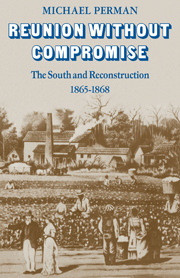Book contents
- Frontmatter
- Contents
- Preface
- Part I Conciliation and conflict
- Part 2 Encouraging Southern loyalty, 1865
- Part 3 Seeking Southern cooperation, 1866
- Part 4 Demanding Southern acquiescence, 1867–1868
- Epilogue: The irrelevance of the moderates, 1865–1868
- Appendix: Registration and voting statistics for the Southern State Constitutional Conventions, 1867–8
- A note on sources
- Index
- Frontmatter
- Contents
- Preface
- Part I Conciliation and conflict
- Part 2 Encouraging Southern loyalty, 1865
- Part 3 Seeking Southern cooperation, 1866
- Part 4 Demanding Southern acquiescence, 1867–1868
- Epilogue: The irrelevance of the moderates, 1865–1868
- Appendix: Registration and voting statistics for the Southern State Constitutional Conventions, 1867–8
- A note on sources
- Index
Summary
Although there have been numerous general studies of the Confederate States during Reconstruction, there has been little or no attempt to analyze and understand the policies adopted and the course pursued by the men who held office in the Southern States at the end of the war. Historians have given scant thought to the political needs and goals of the defeated Southern leadership; they have assumed these were so obvious or inconsequential that further examination was unnecessary. Yet, without examining the preoccupations of the Southern politicians who were in power during 1865 and afterwards, a vital element in the fight for reunion is overlooked. This distortion, however, is exactly what has been allowed to emerge. Much energy has been spent analyzing the policies of the President and the Congress, while little attention has been directed at those in the South whom they sought to reorganize and reconstruct.
This is especially surprising since the group of politicians who held office and therefore wielded political power in the South were central to all of the plans for reconstruction discussed in Washington from 1865 to 1868 while Federal terms and policies were being formulated. The post-war status and position of the Confederacy's political leadership was what Northern policy-makers believed reunion and reconstruction were all about.
- Type
- Chapter
- Information
- Reunion Without CompromiseThe South and Reconstruction: 1865–1868, pp. v - viiiPublisher: Cambridge University PressPrint publication year: 1973

